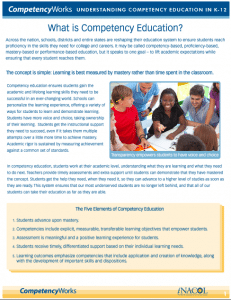Understanding Competency Education: New Introductory Materials Released
CompetencyWorks Blog
 What is competency education? The communication challenge has been bigger than I certainly ever anticipated.
What is competency education? The communication challenge has been bigger than I certainly ever anticipated.
We’ve had a hard time creating powerful elevator speeches. I’ve resorted to using my arms a lot. I start with a left to right motion with both arms as I say; “Our traditional system is based on moving students through school and a curriculum regardless if they learned it. Kids are passed along with C’s and D’s totally unprepared for their next course.” Then curving my arms, opening them wide, I bring them together into a tight circle; “Competency education is about redesigning schools so that they have the flexibility to respond to students, bringing together the instructional support so that they are successful. Students and parents are confident that students are learning every step of the way. Student move on after demonstrating they have mastered the material.” It works as an opening but then I’m left to explain common frameworks and assessments, tempo and pacing, anytime/anywhere, deeper learning and performance assessments.
To help us leap over the communication challenge, CompetencyWorks has prepared three sets of introductory materials that you can use as handouts with parents, community leaders, and policymakers.
- Understanding Competency Education in K-12
- Aligning K-12 State Policy with Competency Education
- Aligning K-12 Federal Policy with Competency Education
We’ve formatted them two ways. The pdf versions above can be easily sent by email or used for resources on your webpage. We have also put the print versions on the Briefing Papers page if you want to print out really nice copies as handouts.
Please feel free to use the text as much as you want as we’ve licensed this under Creative Commons. The goal is to make it easier for you to help people understand competency education.
If you have suggestions for how to effectively communicate what competency education is please do share with us or send us links to your work. We know that we haven’t cracked this challenge yet.
Before you leave this page, could you do a bit of tweeting so that your network knows about the materials? Thanks!